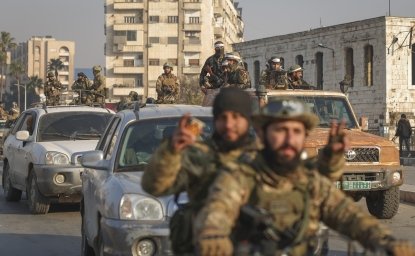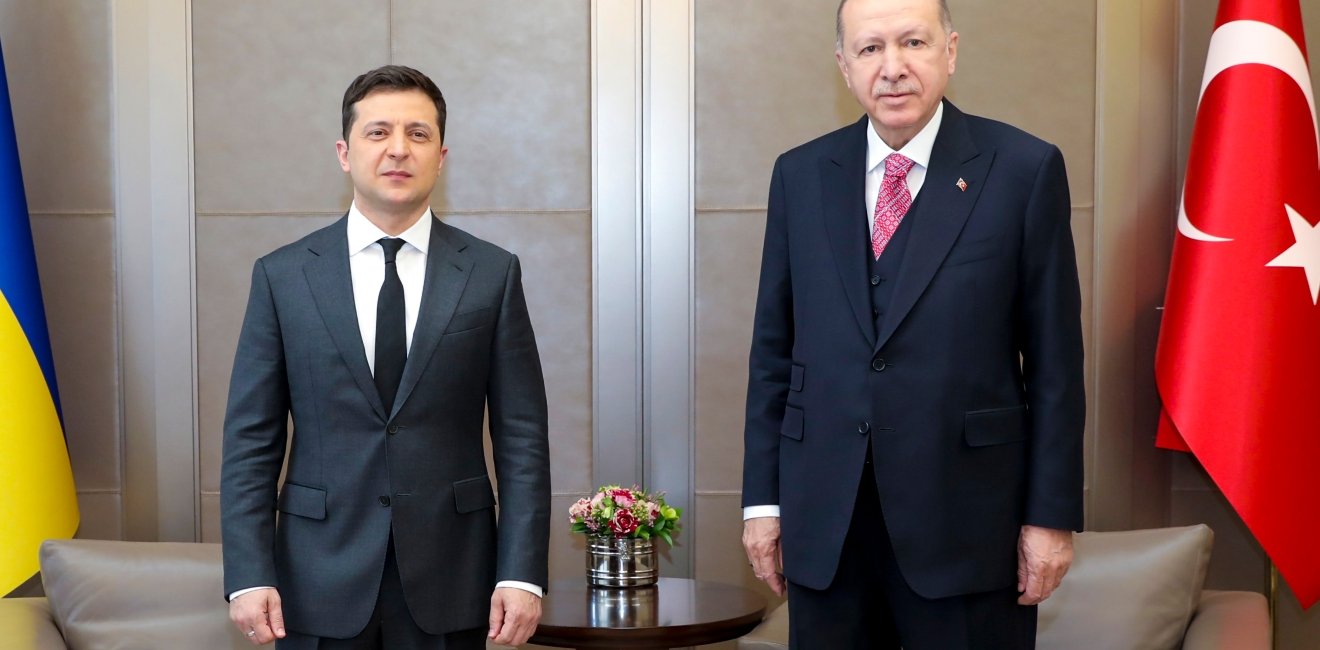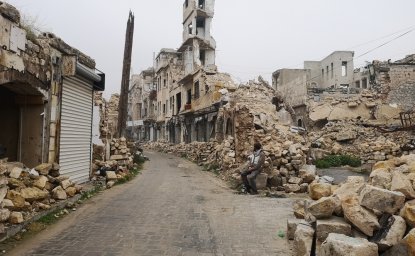While Turkey may not be key to a positive resolution from NATO’s standpoint of the Ukraine crisis, such a resolution is unlikely absent at least Turkey’s acquiescence.
The Russian-Ukrainian crisis impacts Turkey as much as any other NATO state, given Turkey’s long history of conflict over three-hundred years with Russia, and the important Turkish interests threatened by any Russian advance. Turkey also has unique assets for the Western response to Russia, as well as liabilities that could limit Ankara’s usefulness. Thus while Turkey may not be key to a positive resolution from NATO’s standpoint of the Ukraine crisis, such a resolution is unlikely absent at least Turkey’s acquiescence.
Any review of Turkey’s role should begin with an assessment of Ankara’s national interests. At bottom, Turkey is a status quo power. Nevertheless, this reality is masked, and on the margins, even diluted, by its dramatically rising economic and military capabilities over the past twenty years, by the impression that traditional security partner Washington is shifting focus away from Turkey’s neighborhood, and by President Erdogan’s regional ambitions and prickly relations with foreign allies and friends. Thus Turkey pursues a “Gaullist” foreign policy; while ultimately part of the West, committed to the reigning international order, its independent quest for semi-great power status undercuts cooperation in crises if all sides do not manage carefully Alliance-Turkey relations.
Turkey's Assets
Russia: Turkey has had over centuries a complicated relationship with Russia. With the exception of the primarily internal PKK insurgency, Russia is Turkey’s biggest security concern. Although normally on opposite sides in conflicts, Turkey and Russia have also enjoyed détente, for example after World War I and post-1991. Nevertheless, Turks are aware that much of Russia’s imperial expansion came at the expense of Turkey’s predecessor state, the Ottoman empire, and Turks believe Russia seeks further expansion to Turkey’s north, from the Balkans via the Black Sea to the Caucasus, and to its south, in Syria and Libya. The Turks are experts on calibrating relations, challenging Russia on the margins even militarily while avoiding serious rupture.
Ukraine: Turkey has strongly supported Ukrainian independence. A retired senior Turkish official, Ambassador Apakan, long led the Organization of Security and Cooperation in Europe (OSCE) mission in eastern Ukraine, and Turkey strongly condemned Russia’s seizure of Crimea. Geopolitics mixes with historical, ethnic and religious ties in the relationship. The Ottomans maintained for centuries an alliance with the religiously and linguistically related Crimean Tatars, and many thousands of the latter reside in Turkey. The Ecumenical Patriarchate in Istanbul has deep historical ties with Ukrainian Orthodoxy, and Turkey’s foreign policy typically takes into consideration relations with the Patriarch. While trying unsuccessfully to woo Moscow into a Turkish mediating role in the current Kyiv-Moscow conflict, Turkey has been outspoken in condemning Russia’s threats, supporting Ukraine with attack drones and other weaponry, and working well within NATO on common responses - not always Turkey’s default position. Most importantly, Russian control of Ukraine by blunt military seizure or undermining of sovereignty would give Russia full control of the northern Black Sea, and direct access to the Balkans along routes used repeatedly by Russian forces in the 19th and 20th centuries.
The Turks understand that a major Russian success in an endeavor as dramatic as bringing down Ukraine will seriously damage the global order on which Turkey is dependent.
Western Orientation: While President Erdogan and his coalition partners in the National Action Party have a fetish for downplaying Turkey’s integration into the West, that integration remains profound. It begins with the mindset of a large percent of the Turkish population, reaching beyond cosmopolitan elites to more religious elements in cities and towns across the country. Turks see Western Europe, where some four million ethnic Turks have settled, as culturally closer in many respects than the Arab states to the south. Turkey’s economy is integrated into the European and North American economies, beginning with the EU Customs Union, which has contributed decisively to Turkey’s extraordinary GDP growth these past forty years to rank seventeen or eighteen globally. Its NATO orientation remains important to every Turkish government and to most Turks. Ankara’s contributions to the alliance, beginning in the Korean War, even before it was a NATO state, have been significant, as have been the alliance’s deployments in support of Turkey’s security repeatedly since 1991. The Turks understand that a major Russian success in an endeavor as dramatic as bringing down Ukraine will seriously damage the global order on which Turkey is dependent.
Geostrategic Strength: Turkey’s location and control of the Bosporus make it a critical player in almost any military conflict from the Eastern Mediterranean to the Black Sea, Caucasus, and the Arab world. Its military is the second largest in NATO, is combat experienced, and serves under officials not shy about using it, including since 2020 three times against Russian or Russian supported forces in Syria, Libya and Nagorno-Karabakh. Its substantial navy and its air force, while both smaller than Russia’s total inventory, if concentrated could nearly match Russian air and particularly navy assets in the Black Sea region. Finally, it provides much infrastructure for the U.S. and NATO, ranging from the huge Incirlik Airbase to the NATO anti-ballistic missile radar in eastern Turkey.
...and Liabilities
Dependence on Russia: Aware of Russia’s status as a nuclear weapons state and UN Security Council Permanent Member, Turkey understands it can easily come out second in any one-on-one diplomatic or military conflict with Moscow. Moreover, the Turkish energy sector remains dependent on Russian natural gas for roughly fifty percent of its needs (its most important energy component) and on Russian technology for Turkey’s emerging nuclear energy program. Exports to Russia and Russian tourism are essential for Turkey’s often anemic trade balance, and Putin used trade and tourism sanctions effectively after Turkish forces shot down a Russian fighter-bomber in 2015 to bring Ankara to heel. But relations between important states, even if not of comparable size are a two-edged sword. Putin sees his relationship with Erdogan as a strategic plus, promotes greater Turkish independence from Washington, and has been careful in Syria and elsewhere not to corner Ankara. Dependency on gas via pipeline also cuts both ways. Russia has no easy alternative market for gas pulled from the Turkish market.
Unlike other independent minded NATO states, Turkey doesn’t "talk the talk” of alliance solidarity and global order even when it’s "walking the walk."
19th Century Great Power Orientation: The Turks’ formative diplomatic experience was, in contrast to many NATO states, neither World War II nor the “present at the creation” development of containment in the late 1940s. Rather, it was the 19th century "great game", with the Ottomans one of the players, and its extension post-World War I in the Italian, French, Greek and Russian campaigns in Turkey. Turks think in realpolitik terms, especially with the importance given to power relationships, in many ways a good thing compared to many European allies. But this orientation forces Turkey to maintain the trappings of imperial power, such as the Montreaux Convention, and to never commit fully to one side or the other. After all, the key player of the 19th century, Great Britain, fought Turkey in the War of Greek Independence, allied with it in the Crimean War, and was all over the map in the various Balkan wars 1876-1914. Turkey never wants to be more than 85 percent on one side. Thus it buys advanced missiles from Russia and mortgages much of its energy to Moscow’s decisions in order to avoid over-dependency on the West. Furthermore, this orientation, and the Turkish public’s various insecurities towards its Western allies, mean that its engagement within the global order, however beneficial, is an affair of the mind, not the heart. Unlike other independent minded NATO states, Turkey doesn’t “talk the talk” of alliance solidarity and global order even when it’s “walking the walk.”
President Erdogan: This 19th century orientation is exacerbated by President Erdogan, who thinks very much in those terms, does not appear personally wedded to Western values, and is chained to a coalition partner, the National Action Party, with blatantly anti-western attitudes. In addition, in the past decade Erdogan pursued a "neo-Ottoman” strategy in the middle east, by sponsoring the mix of democracy and Islam found in the Muslim Brothers movement, but anathema to essentially all of the region’s leaders from Assad to the Saudi King and Israeli Prime Minister. The result was diplomatic isolation and greater international distrust of his motives. In the past year the Turkish government has recognized the fix it had gotten itself into, and Erdogan has pursued a diametrically different policy, seeking closer ties to Israel, Saudi Arabia, the UAE and Egypt. This has removed some of the rancor Turkish foreign policy initiatives were encountering, but it will take more time to rebuild trust.
Courses of Action
Turkey will act vigorously to oppose any dramatic Russian gain in Ukraine. Given its capabilities, that is an important plus for NATO. In addition, it almost certainly will avoid dangerous provocations of Moscow, as Turks remember the reaction to the 2015 shoot-down. So far, so good. However, there is no guarantee that Turkey will coordinate with the rest of NATO, nor that Erdogan will resist direct appeals to Turkish pride or singularity by Putin. NATO, particularly Washington, which Turkey takes seriously, needs to keep this in mind in overall Ukraine planning and outreach to Turkey. The following are guidelines to manage this outreach:
First, specific Turkish security and geostrategic concerns matter. It is one of only six "frontline" NATO states facing Russia, and by far the strongest of them. But it has unique concerns and arrangements (sea as well as land security, PKK, its treacherous borders with Syria, Iraq and Iran, Montreaux Convention, carve-outs from earlier pan-European conventional forces agreements) vital to the state and much of its population. Some of these specificities are not well-known, thus the need for advance high-level coordination before launching any NATO or Washington approaches.
Second, talk to Erdogan. Such high level coordination begins with him. His foreign policy and security team is experienced and top notch, but Erdogan is increasingly isolated and at times listens more to demi-monde advisors. He has a relationship with both President Biden and the NATO Secretary General, and these channels need to be engaged more often.
Third, details matter. Turkey is meticulous to a far greater degree than the United States on the actual language of key texts and agreements, and does not easily suffer deviations from precedent; thus Turkey’s blockage for months of NATO military plans, now critical for the Baltics, over NATO reneging on obscure language related to the PKK.
Beware of Russia. Moscow understands both Turkey’s geostrategic strengths and also its vulnerabilities. NATO and Washington must "red team" Turkish concerns and possible divergences from alliance unity, to predict and coutner Russian exploitation.
Fifth, respond to Ankara quickly. Given its exposed position, unique regional security threats and likely Russian efforts, clarity on Western positions is essential to keep Turkey aligned when it encounters crises. Western response to Ankara was slow and ambiguous in three serious situations: in 2015, the Russian aircraft shoot-down, 2016, the Gulenist coup, and 2020, the Idlib confrontation with Russia. In the first two, Washington and other capitals, wary of Erdogan, waited for ever more information. But Putin got it right, reaching out immediately with demands in 2015 and support in 2016. In 2020 Erdogan was his own worst enemy, scotching a U.S.-Turkish coordinated effort for Idlib support from NATO European states by a petty provocation along the Greek border. The benefits of delaying to get details right or avoid small mistakes are far outweighed by the plus of immediate response.
Finally, make redlines clear. Turkey has a history, particularly with Erdogan, of going its own way, assuming it contributes more to the West than the West to it. Thus it takes Western support as a given, and then acts in ways that are counter-productive to overall alliance solidarity. Washington should make clear its redlines with Turkey, ensure they concentrate only on critical crisis-related issues, not the myriad of minor irritations, and lay out the consequences if Turkey ignores them.
The views expressed in this article are personal to the author and do not represent those of the Wilson Center, which does not take positions on policy issues.
Author
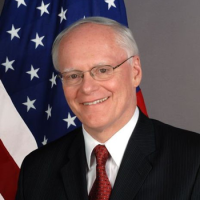
Former ambassador to Iraq and Turkey, and Special Envoy to the Global Coalition To Defeat ISIS

Middle East Program
The Wilson Center’s Middle East Program serves as a crucial resource for the policymaking community and beyond, providing analyses and research that helps inform US foreign policymaking, stimulates public debate, and expands knowledge about issues in the wider Middle East and North Africa (MENA) region. Read more


Kennan Institute
The Kennan Institute is the premier US center for advanced research on Eurasia and the oldest and largest regional program at the Woodrow Wilson International Center for Scholars. The Kennan Institute is committed to improving American understanding of Russia, Ukraine, Central Asia, the South Caucasus, and the surrounding region through research and exchange. Read more

Explore More
Browse Insights & Analysis
Imamoglu’s Arrest Sparks Nationwide Unrest and Raises Fears for Turkish Democracy
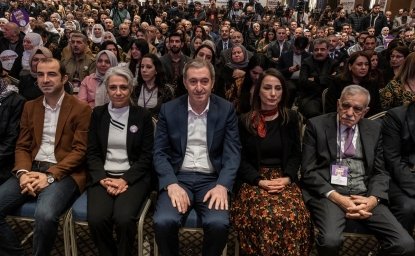
Kurdish Militant Group PKK Agrees to Disarm as Turkey Weighs Next Steps
